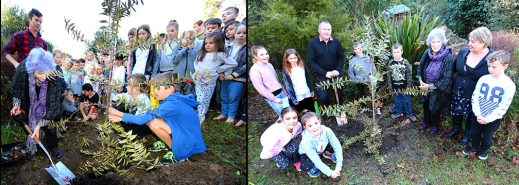News
Published 30 July 2018School stands tall behind kauri
Symbolic planting of a kauri on school grounds and other classroom activities.
Northland's biosecurity ambassadors of the future are playing their part to keep kauri standing, with the symbolic planting of a kauri on their school grounds, and other classroom activities.
Students and teachers from Whangarei Heads School today joined with national Kauri Dieback Programme partners, including iwi, Northland Regional Council, and Biosecurity New Zealand (part of the Ministry for Primary Industries), in support of ongoing efforts to protect the forest icon. These efforts are particularly timely as New Zealand Biosecurity Week is underway.
The school was chosen to be presented with a young kauri for planting, out of more than 70 that recently took part in a virtual field trip exploring dieback disease. This has also been supported by students' own learning activities in the classroom.
"This is really authentic learning, as we can see what impact this devastation can have on our local environment, including on our very own Mount Manaia," acting principal Denise Humphries says.
"I'm so proud of the way the children in Room 2 have responded to the kauri dieback problem, and the way they've been inspired and challenged by their teacher Mr Higgison to come up with some unique solutions and present them. They realise that there is a need to keep kauri alive for future generations," she says.
Bruce Howse, Northland Regional Council group manager, environmental services says "Maintaining and improving the health of our forests is an intergenerational challenge, so environmental education really is the key to awareness and lasting action. The virtual field trip is a unique and engaging way to involve children right across Northland, in what will be an ongoing battle to save our iconic kauri."
Run by MPI and LEARNZ, the virtual field trip was designed to continue strengthening community relationships across the kauri dieback programme, and increase awareness with young biosecurity ambassadors of the future about the need to protect these iconic trees. It also explored Māori cultural connection, science and research, and behaviour change for managing the spread of kauri dieback.
Biosecurity New Zealand manager of recovery and pest management, John Sanson, thanked all of the schools, teachers and students who took part in the virtual field trip and who continued to support the programme with other activities.
"These students of today will be among the scientists, researchers, conservationists, and decision-makers of tomorrow, so their contribution is vitally important to increasing our awareness of kauri dieback disease and protecting kauri into the future."

Left: Julie Holt, Enviroschools, helping students to plant the kauri tree. Right: Northland Regional Council, MPI, and Enviroschools representatives with students next to the kauri tree
Further information on kauri dieback
First published by Ministry of Primary Industries, 27 July 2018
